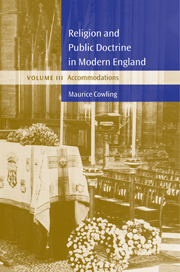Book contents
- Frontmatter
- Contents
- Foreword and acknowledgements
- Introduction
- I The Christian intellect and modern thought in modern England
- 1 The reanimation of Protestantism I
- 2 Christianity and literature I
- 3 The reanimation of Protestantism II
- 4 The enlargement of Christianity
- 5 Christianity and literature II
- 6 Christianity and modern knowledge I
- 7 Whiggism, Liberalism and Christianity I
- 8 Whiggism, Liberalism and Christianity II
- 9 Christianity and modern knowledge II
- 10 Christianity in an unfriendly world I
- 11 Christianity in an unfriendly world II
- 12 Christianity in an unfriendly world III
- 13 Christianity in an unfriendly world IV
- 14 Christianity in an unfriendly world V
- II The post-Christian consensus
- III Conclusion: religion and public doctrine in modern England
- Notes
- Index of proper names
14 - Christianity in an unfriendly world V
Published online by Cambridge University Press: 23 December 2009
- Frontmatter
- Contents
- Foreword and acknowledgements
- Introduction
- I The Christian intellect and modern thought in modern England
- 1 The reanimation of Protestantism I
- 2 Christianity and literature I
- 3 The reanimation of Protestantism II
- 4 The enlargement of Christianity
- 5 Christianity and literature II
- 6 Christianity and modern knowledge I
- 7 Whiggism, Liberalism and Christianity I
- 8 Whiggism, Liberalism and Christianity II
- 9 Christianity and modern knowledge II
- 10 Christianity in an unfriendly world I
- 11 Christianity in an unfriendly world II
- 12 Christianity in an unfriendly world III
- 13 Christianity in an unfriendly world IV
- 14 Christianity in an unfriendly world V
- II The post-Christian consensus
- III Conclusion: religion and public doctrine in modern England
- Notes
- Index of proper names
Summary
The creed of the English is that there is no God and that it is wise to pray to Him from time to time.
(Alasdair MacIntyre, God and The Theologians, 1963, reprinted in Against the Self-Images of the Age, 1971, p. 26)The pathos of modern theology is its false humility. For theology, this must be a fatal disease because once theology surrenders its claim to be a meta-discourse, it cannot any longer articulate the word of the creator God … A theology ‘positioned’ by secular reason … either … idolatrously connects knowledge of God with some … immanent field of knowledge … or it is confined to intimations of a sublimity beyond representation, so functioning to confirm negatively the questionable idea of an autonomous secular realm, completely transparent to rational understanding.
(John Milbank, Theology and Social Theory, 1990, 1993 edn, p. 1)Just as an education which purports to be neutral between rival controversial religious standpoints always ends up in teaching no religion at all … so an education which purports to teach a morality neutral between rival controversial standpoints concerning the virtues will end up in teaching a largely indeterminate morality.
(Alasdair MacIntyre, How to Seem Virtuous Without Actually Being So, Lecture at the University of Lancaster, 1991, p. 16)In many of the chapters in Part I, we have discussed thinkers who wished to reconcile Christianity with modern life and knowledge by ridding it of the theological and sociological encumbrances of two millennia.
- Type
- Chapter
- Information
- Religion and Public Doctrine in Modern England , pp. 371 - 388Publisher: Cambridge University PressPrint publication year: 2001

